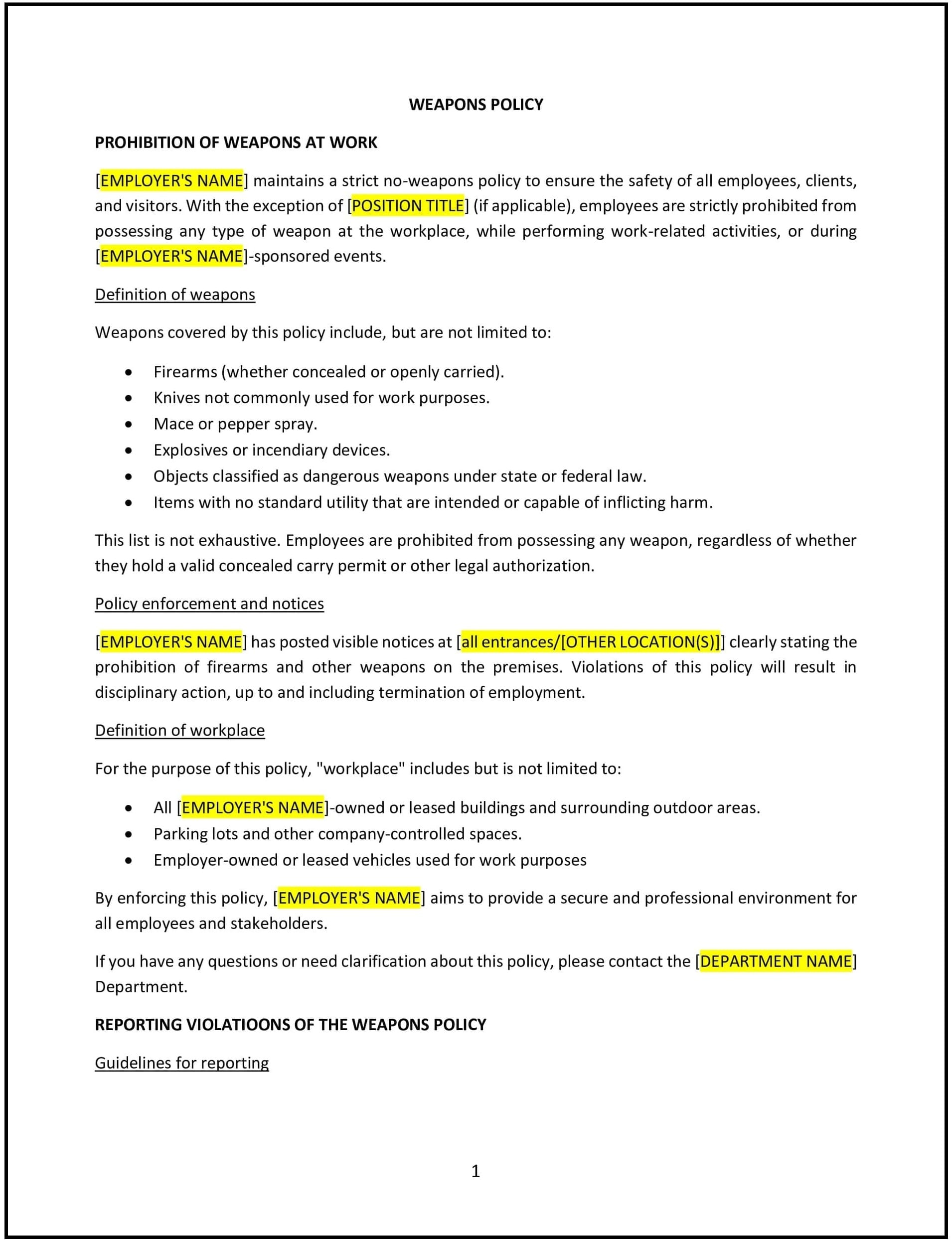Got contracts to review? While you're here for policies, let Cobrief make contract review effortless—start your free review now.

Customize this template for free
Weapons policy (Ohio)
A weapons policy outlines the guidelines and restrictions for employees regarding the possession and use of weapons in the workplace. This policy is designed to ensure a safe environment by prohibiting firearms, explosives, or other weapons on company premises, unless explicitly authorized under specific conditions as permitted by Ohio state law. It defines the scope of what constitutes a weapon, details exceptions where applicable (such as for law enforcement personnel), and sets forth the procedures for employees to follow if they encounter a weapon on site.
By implementing this policy, Ohio businesses can proactively manage risks related to weapons in the workplace, promote safety, and ensure compliance with legal regulations.
How to use this weapons policy (Ohio)
- Define prohibited items: The policy should clearly outline what constitutes a weapon, including firearms, knives, explosives, or any object used with the intent to harm. It should specify that weapons are prohibited on company property, including in company vehicles or while conducting business off-site.
- Establish exceptions: The policy may allow exceptions for certain individuals, such as law enforcement officers or those with specific permits allowed by Ohio state law. The policy should clarify who is exempt from the general prohibition and under what circumstances.
- Set procedures for reporting weapons: The policy should specify how employees should report the presence of a weapon on the premises, including the appropriate channels for reporting (e.g., security, HR, or a supervisor). It should ensure that employees feel safe and confident in reporting potential threats.
- Clarify disciplinary actions: The policy should define the consequences for violating the weapons policy, which may include termination or legal action, depending on the severity of the violation. The policy should be clear about the business’s zero-tolerance stance on workplace violence or threats.
- Ensure safety protocols are in place: The policy should establish safety protocols for handling situations where a weapon is found, including how employees should react, who should be notified, and how the weapon will be removed from the premises securely.
- Provide training for employees: The policy should mandate training for employees on workplace safety and the handling of situations involving weapons or threats, ensuring they are aware of the policy and how to report concerns effectively.
- Review and update regularly: The policy should be reviewed periodically to ensure it aligns with Ohio state laws, federal regulations, and the evolving needs of the business, particularly in relation to changes in gun control laws or workplace safety practices.
Benefits of using this weapons policy (Ohio)
This policy provides several key benefits for Ohio businesses:
- Promotes workplace safety: By prohibiting weapons and establishing clear guidelines for reporting and managing weapons-related incidents, the policy helps create a safer environment for employees.
- Reduces the risk of violence: A clear weapons policy helps deter the potential for workplace violence or harm by addressing weapons-related risks proactively.
- Protects employee well-being: The policy protects employees from the dangers posed by weapons in the workplace, offering them peace of mind knowing that the business takes their safety seriously.
- Ensures legal compliance: By adhering to Ohio state laws and federal regulations regarding weapons, businesses reduce the risk of legal repercussions related to weapons possession on company premises.
- Builds a culture of safety: The policy reinforces the business’s commitment to a safe and respectful workplace, enhancing overall employee morale and trust in the organization’s leadership.
- Reduces liability: By implementing a weapons policy, the business minimizes its liability in the event of a weapon-related incident, as the policy clearly defines the expectations and consequences for such behavior.
Tips for using this weapons policy (Ohio)
- Communicate the policy clearly: Ensure that all employees are aware of the weapons policy by including it in the employee handbook, during onboarding, and through periodic safety briefings or training sessions.
- Enforce the policy consistently: Apply the weapons policy consistently across all levels of the organization, ensuring that no exceptions are made unless clearly outlined in the policy (e.g., for law enforcement officers with the proper permits).
- Encourage employees to report concerns: Make sure employees know they can report concerns about weapons in a confidential and safe manner, without fear of retaliation.
- Provide appropriate training: Offer training to employees on workplace safety, conflict resolution, and how to handle situations where a weapon might be present. This ensures that employees know how to act if they encounter a weapon on site.
- Regularly assess workplace safety: Regularly assess the workplace environment to identify potential risks related to weapons or violence. Use employee feedback, incident reports, and safety audits to refine safety protocols and adjust the policy as needed.
- Review the policy periodically: Review the policy at least annually to ensure it complies with Ohio state laws, federal regulations, and any updates in workplace safety standards or firearm-related legislation.